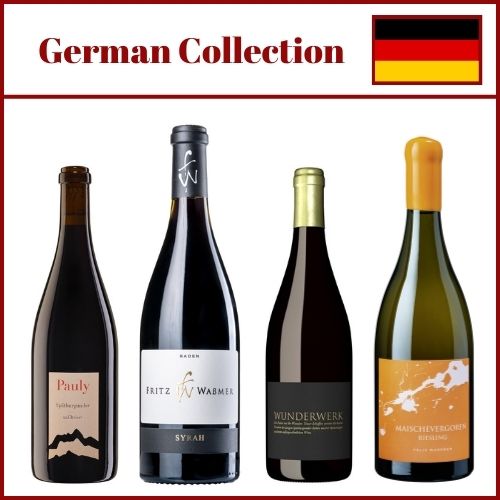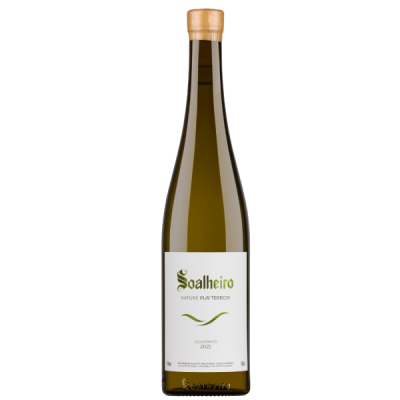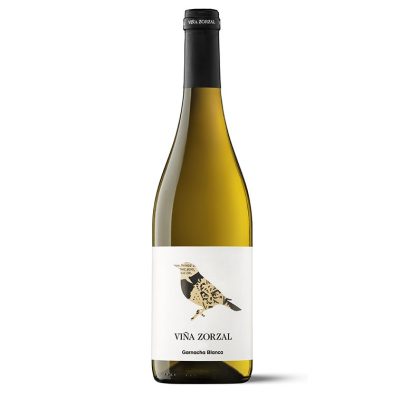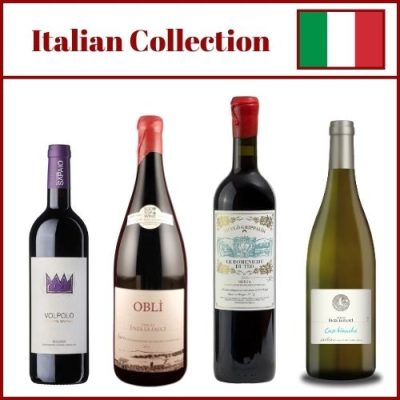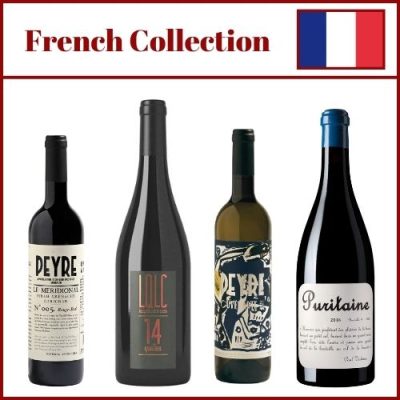Mixed Wine Box, German Collection
Spätburgunder Réserve 2019
Grape: Pinot Noir
Alcohol: 13% abv
Type: Dry Red
Vintage: 2019
Format: 75cl
Classification: Qualitätswein
Region: Mosel
Country: Germany
Syrah 2017
Grape: Syrah
Alcohol: 13.5% abv
Type: Dry Red
Vintage: 2017
Format: 75cl
Classification: Qualitätswein
Region: Baden
Country: Germany
Wunderwerk Spätburgunder 2017
Grape: Pinot Noir
Alcohol: 13.5% abv
Type: Dry Red
Vintage: 2017
Format: 75cl
Classification: Ortsweine (Village Wine)
Region: Rheinhessen
Country: Germany
Riesling (Mash-Fermented) 2017
Grape: Riesling
Alcohol: 12% abv
Type: Dry Natural White
Vintage: 2017
Format: 75cl
Classification: Landwein
Region: Baden
Country: Germany
If any of the wines is not available at the time of order, an adequate replacement of the same value or higher will be added instead.
€165.00 Original price was: €165.00.€156.75Current price is: €156.75.
Related products
You may also like…
-
Mixed Wine Box, Italian Collection
€119.00Original price was: €119.00.€113.00Current price is: €113.00. Add to basket -
Mixed Wine Box, French Collection
€112.00Original price was: €112.00.€106.40Current price is: €106.40. Add to basket
Description
Spätburgunder Réserve 2019
Axel Pauly cultivates his wines on approximately 9 hectares of vineyards, some of which have a gradient of up to 70%! The cultivated areas all face south or southwest and consist exclusively of different layers of slate rock. The winegrower focuses on naturalness, straightforwardness and the typical taste patterns of Moselle soils when developing his wines. Axel’s wines are characterized by clarity, a crystalline characteristic, length and a great minerality all coming from the grey and blue slate soils in this cool climate. Nature did not make it as easy for the winegrowers on the Moselle as it was in 2018.
2019 was a demanding vintage with many capricious weather conditions: Frost in spring, drought, heat and sunburn in summer and rain in autumn. There was a 25% drop in yield compared to the particularly lush previous year. Some wineries had up to two thirds less yield than in 2018, but the winegrowers on the Mosel, Saar and Ruwer are generally very satisfied with the quality of the grapes.
Mash fermentation in tubs for 51 days, gentle pressing, maturation in 2-3 years old barriques for 13 months, malolactic fermentation, racked 3 times using only gravity & bottled unfiltered by hand – totally produced without technical support. Purple red colour with a nose full of red fruits, slight oak aromas, vanilla & spices.
On the palate this is a very elegant Pinot Noir with balanced tannins, well integrated oak, ripe red fruits &a silky finish.
Syrah 2017
Black pepper, plum and raspberry in the bouquet, accompanied by some green herbs. The body is dense and compact, with plenty of grip, youthful red and somewhat dark fruit, such as blueberries and blackberries, flanked by subtle nuances of fennel and cocoa. This wine is just at the beginning of its development; its density will loosen, the solid structure will soften, its secrets will be revealed with a lot of aeration or a few years in the cellar.
The premium wine range are coming from carefully selected vineyards. These vineyards may have specific characteristics, such as unique soil types, optimal microclimates, and well-established vines, which contribute to the wines’ exceptional quality. There wines are aged for an extended period to develop complexity, depth, and character with various aging techniques, such as aging in oak barrels, to impart additional flavors and textures to the wines.
Wunderwerk Spätburgunder 2017
Riesling (Mash-Fermented) 2017
Skin contact Riesling from Baden vinified by Felix Waßmer (Fritz’s son). The is a wine that has to be tasted rather than read about. It’s a wine made with a lot of love for the grape itself and the experimental techniques used.
The Riesling is fermented in barrique. For this process, the hoops were removed, the lid taken off, and the grapes filled in. Then, it was sealed again for fermentation. It consists of 60% whole grapes and 40% de-stemmed grapes.
During fermentation, the grapes in the barrique were stomped down, and the barrel rotated.
At the end of fermentation, the grapes were removed from the barrique (for which the barrel was opened again), pressed, and the last 5% of the fermentation occurred again in the same barrique. The wine then aged there for another 12 months before it was transferred to a stainless steel tank, where it aged for another 12 months before being bottled.
Sulfur was used very sparingly, only in crucial phases that served to protect the wine.

